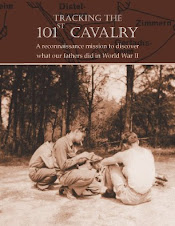I realize now that I haven't given much detail about this event, other than B Troop, 116th Squadron of the 101st Cavalry, liberated OFLAG-VIIA, where Majcherkiewicz and many others were held captive.
Over the next few blogs, I hope to write more about OFLAG-VIIA and the men who were imprisoned there. I received a number of comments--mostly questions--on both that initial blog post and on photos I have posted in my photo gallery. I have received answers to some of those questions, and hope to put together a few more posts, but first, I need to outline what happened on Sunday, April 29, 1945.
The sound of gunfire awakened the prisoners at OFLAG-VIIA in Murnau, Germany, that morning. As they left their quarters, they saw an American plane circling overhead and the sound of gunfire from the north continued. By afternoon--16:55 according to records of the 12th Armored Division--the Americans had reached the camp, and a small group of cars driven by Nazi SS drove toward the Americans. Right outside the gate of the camp, a firefight began and two of the SS were killed (Colonel Teichmann and Captain Widmann).
Two American tanks began pursuing the SS cars, which were fleeing back to Murnau. Another tank entered the camp through the main gate. The first Americans through the gate were Polish: Corporal Richard Pawlowski of Chicago and a soldier originally from Kalisz, Poland.
 |
| B Troop, 116th Squadron, liberates OFLAG-VIIA. Photo taken by 2nd Lt. Edward Newell, U.S. Army Signal Corps |






2 comments:
My German mother (age 6 at the time) and her family were evacuated from Pirmasens due to the Allied invasion and were settled in the town of Merkendorf. Imagine my surprise as I researched the flow of battle in that phase of the war to discover not only that the 101st entered Pirmasens, but some 6-8 weeks later also fought and occupied Merkendorf. My mother still tells a story where she was pushed aside by other older children when the Americans would drive up in a jeep to deliver staples (sugar, coffee, etc.) She ended up at the back of the jeep, noticed the Sergeant's behind hanging over the rear spare tire, and gave it an aggressive pinch. He was startled...turned around, then laughed. She got her ration. My grandmother also had stories. Look forward to reading the book.
Michael, I had several veterans tell me about the battle in Merkendorf. I love the story about your mother. She was very brave at six.
Post a Comment